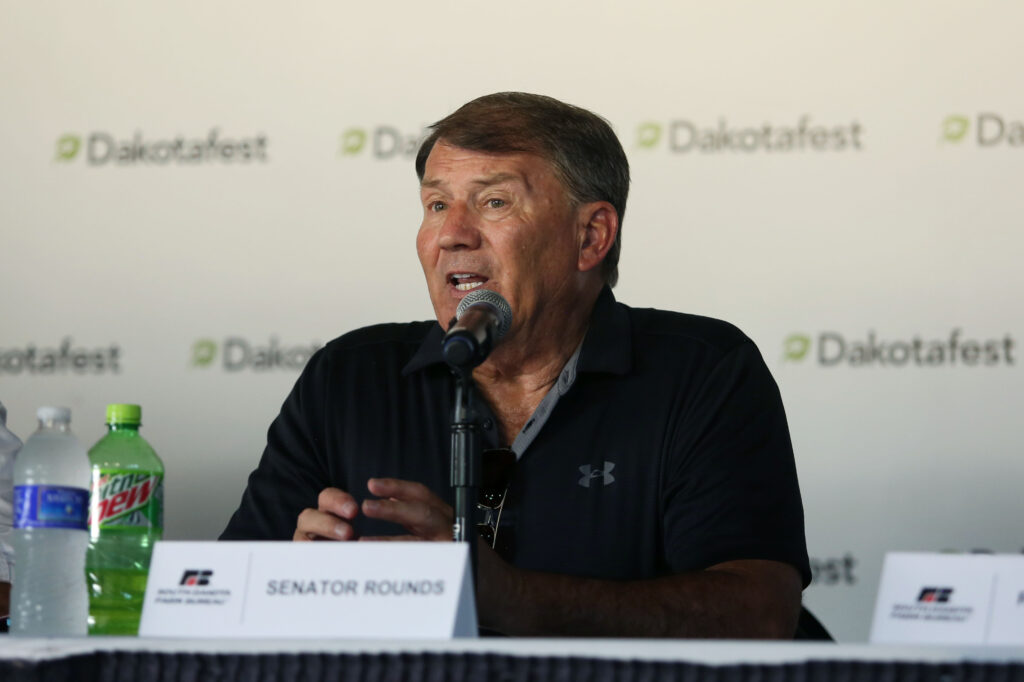
U.S. Sen. Mike Rounds, R-South Dakota, speaks at Dakotafest in Mitchell on Aug. 20, 2025. (Makenzie Huber/South Dakota Searchlight)
On July 21, President Donald Trump wholeheartedly endorsed South Dakota’s junior Republican senator, Mike Rounds, in the lawmaker’s quest for a third term in 2026.
But at what cost for Rounds?
Despite calling the senator a “jerk” some years ago and vowing never to support him (because he called the 2020 election “fair”), the president in July praised Rounds, in a 180-degree turnaround, as an “incredibly strong advocate for the wonderful people of South Dakota” and said he was giving Rounds a “complete and total endorsement for re-election—HE WILL NEVER LET YOU DOWN!”
What a difference several years can make.
For Rounds’ reelection campaign, the direct support of the authoritarian-minded leader of his party and the nation, and of the free world, was extremely valuable — even critical.
“With Trump’s endorsement, Rounds will be a clear favorite to win reelection next year in the solidly conservative-leaning state,” according to The Hill, a leading political news source in the U.S. capital.
Rounds wins Trump endorsement after playing deal-making role in rescinding public media funds
However, as with many interactions with Trump, it was more transactional than genuinely moral or fairly reciprocal. A deal, in other words. But a very bad deal for rural Americans, it turns out.
For the president’s end of the deal, he wanted Rounds to vote “yes” in the Senate on a bill to cut $9 billion in previously congressionally approved funding that included $1.1 billion for the Corporation for Public Broadcasting. The bill, which ultimately passed with Rounds’ support, removed all federal financial support for NPR, PBS and their member stations — and roughly $8 billion in foreign aid.
Trump signed an executive order in May demanding the cuts to the corporation, whose PBS and NPR outlets he has for years controversially complained have been spreading political and cultural views he disagrees with. Congress approved the cuts in July, and the corporation — “a cornerstone of American culture for three generations,” PBS fairly noted — was thus forced to shutter.
Initially, Rounds had expressed reservations concerning Trump’s desire to cancel the funding, but decided to support the executive action after announcing that he’d negotiated a deal with the administration to transfer $9.4 million of federal funding to some two dozen Native American radio stations in several states that depend on the subsidies for their survival. Indigenous South Dakotans are a key Rounds political constituency, comprising 78,000 people, about 9% of the state’s approximately 900,000 residents, many of them members of nine federally recognized tribes.
On his website, Rounds explained: “In order for me to support this legislation, we had to find a way to continue support for these radio stations which offer potentially life-saving information in some of the most rural parts of our nation. These stations play a vital role in South Dakota, delivering critical emergency alerts and public safety information, and they needed to be protected.
“… With nearly $37 trillion in federal debt, we must preserve essential services but also take meaningful steps to reduce wasteful spending. As a member of the Senate Appropriations Committee, I will continue working to both rescind unnecessary spending and preserve funding for tribal radio in future appropriations bills.”
New commentary delivered to you: Sign up for our free newsletter.
All well and good. But what about all the other Native (and non-Native) citizens throughout rural America? What about their public TV/radio stations — hundreds of them — that are presumably as critical for their communities and as deserving of federal support as those serving Indigenous South Dakotans?
Republican Sen. Susan Collins of Maine, who voted against the cuts, stressed that “more targeted” means exist to address any alleged bias at PBS and NPR other than cutting all funding, in effect throwing the baby out with the bathwater. It could also be fairly argued that PBS and NPR have long been renowned for fair, balanced reporting and programming, though they arguably lean liberal.
In a perfect world, Rounds would have ultimately voted “no” to the cuts, thus tanking Trump’s biased, mean-spirited executive order that will disadvantage millions of rural Americans. As it was, Vice President J.D. Vance had to deliver the tie-breaking vote to begin debate on the bill when Sens. Collins, Lisa Murkowski of Alaska and Mitch McConnell of Kentucky each voted “no.”
If Rounds had joined those colleagues on their moral high ground, now-doomed PBS and NPR stations might have survived to serve the underserved another day.
But he regrettably chose self-interest over self-respect — reelection over uprightness.
More about public media funding
- Trump drive to defund NPR, PBS resisted by Republicans from rural states
- SD senator’s deal sparing tribes helps advance bill stripping funds from NPR, PBS, foreign aid
- Thune, Rounds vote yes as US Senate moves to claw back funding for NPR, PBS, foreign aid
- ‘In The Moment’ and ‘South Dakota Focus’ shows caught in local public broadcasting cuts and layoffs
- Grant program for tribal radio stations will start in October, Rounds says

